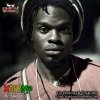dimasterblaster
New Member
From the forthcoming EP "Vintage 21"
Listen!!!! Download!!! Share!!! https://app.box.com/s/q5p16gzr2464u9c8r2se
Listen on SoundCloud: http://bit.ly/1cYwSlk
Xtr3me Biography
The dawn of a young revolutionary, musical visionary on a mission, this is how his story began.
He was born Dwayne Nelson on November 1, 1992 at Spanish Town Hospital (St. Catherine, Jamaica) to parents Juandyln Scott and Wayne Nelson starting from a humble beginning. The early years were rough ones he recalled. He grew up not knowing his father and at a very tender age moved to Clarendon to live with his foster grandmother. In the midst of all this however a beautiful thing began, the young Dwayne found a passion for music. He was always singing, there was no doubt in his talent even at that age as he sung lead on the Youth’s choir but the story was just about to take a twist.
In his eyes he saw inconsistency in the current religious beliefs of the environment he was in and began his journey to seek his true identity, music was at rest for a while but it wouldn’t go to sleep. It was of a different nature when his passion reignited this time in the form of dancehall music while he was in grade 8. It was a whole different experience, linked up with Roiall and within that same period they formed a group and began clashing with other schools and that was ok for a while but then another alteration occurred. Xtr3me after analysing it all had finally realized his true love was for reggae music. Reggae music brought him insight that no other genre had given, and his quest for identity had finally bared fruit.
Gregory Isaacs, Bob Marley, Peter Tosh, Sizzla, Mutabaruka, Beres Hammond, Dennis Brown all played vital roles in defining his identity. The “Old School” he said, “there music was saying something about the black man that I know to myself was true, and I felt like a king”. He was also an ardent student of Marcus Garvey and his very influential foster brother Ras Kemar who taught him about farming and independence, they were both great role models which made his choice to become a true Rasta even easier. His transition to Rastafari was not an easy road as many were disappointed after finding out he wasn’t locking his hair to be a fashion dread, but in adopting this principles of Rastafari he found his true identity.
Listen!!!! Download!!! Share!!! https://app.box.com/s/q5p16gzr2464u9c8r2se
Listen on SoundCloud: http://bit.ly/1cYwSlk
Xtr3me Biography
The dawn of a young revolutionary, musical visionary on a mission, this is how his story began.
He was born Dwayne Nelson on November 1, 1992 at Spanish Town Hospital (St. Catherine, Jamaica) to parents Juandyln Scott and Wayne Nelson starting from a humble beginning. The early years were rough ones he recalled. He grew up not knowing his father and at a very tender age moved to Clarendon to live with his foster grandmother. In the midst of all this however a beautiful thing began, the young Dwayne found a passion for music. He was always singing, there was no doubt in his talent even at that age as he sung lead on the Youth’s choir but the story was just about to take a twist.
In his eyes he saw inconsistency in the current religious beliefs of the environment he was in and began his journey to seek his true identity, music was at rest for a while but it wouldn’t go to sleep. It was of a different nature when his passion reignited this time in the form of dancehall music while he was in grade 8. It was a whole different experience, linked up with Roiall and within that same period they formed a group and began clashing with other schools and that was ok for a while but then another alteration occurred. Xtr3me after analysing it all had finally realized his true love was for reggae music. Reggae music brought him insight that no other genre had given, and his quest for identity had finally bared fruit.
Gregory Isaacs, Bob Marley, Peter Tosh, Sizzla, Mutabaruka, Beres Hammond, Dennis Brown all played vital roles in defining his identity. The “Old School” he said, “there music was saying something about the black man that I know to myself was true, and I felt like a king”. He was also an ardent student of Marcus Garvey and his very influential foster brother Ras Kemar who taught him about farming and independence, they were both great role models which made his choice to become a true Rasta even easier. His transition to Rastafari was not an easy road as many were disappointed after finding out he wasn’t locking his hair to be a fashion dread, but in adopting this principles of Rastafari he found his true identity.

